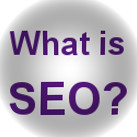What is Search Engine Optimization?
Search engine optimization (SEO) is the process of optimizing a Website so that it can be better found in search results. There are a variety of factors that the search engines such as Google, Bing and Yahoo, use to determine whether a Website is worthy of being on that first page or in the top position.
Basics of Search
Search engines are just robotic like programs that are constantly visiting Websites on the World Wide Web (called crawling). They gather data about the Website, its content and what each site it about. Then this data is used to come up with an “index”, a huge directory of the entire internet, (consisting of over 60,000,000,000,000 pages and over 1 billion searches about those pages per day).
Algorithms
Search engines use mathematical algorithms to determine what page belongs where and how it is related to other pages on the Web. Many factors are considered in determining a page’s relevance to the search term.
Keywords On Website
On the Website side, the search engine finds these keywords along with many other factors like were on the page they are found, if they where in a heading, the size of the heading, if there are any links pointing to this page with that keyword in it as anchor text, the relevance of the site that has pointed a link at the page, if the page title and or URL have the keyword in them, and many more factors.
Keyword Search
When a user enters a keyword or key-phrase into a search field, those keywords are compared to the index to find the most relevant match, then the second, third and so on. The best match doesn’t always win however. There are many other factors to consider. In the end, the magic usually happens and the search term is united with the best fitting Web page and a users get what they are looking for.
On Site Optimization
On site optimization consist of things like making the titles, headings, subheadings relevant to what the text on that page is about. Making sure the links on the page actually go to somewhere and that the structure of text and links all work together in a useful manor. In other words, making sure that the page is a good user experience. It is all about the user, not search engines, rank, positions etc. If you have great content, chances are you will get good positions and have a ton of traffic to your Website also. People will link to that content giving you basically a “Google vote” saying that your site is a good place to visit.
Off Site Optimization
Websites, by their nature, do get found by some users. But to improve the chances of success, there are many things that can be done off site to help the website do better in search results pages and also get additional traffic.
Links
Links are effectively a way for Google to tell that your content is worth something. When you have extraordinary content, people will want to share it with others and this usually happens by mentioning your web page with a link that points to it for user convenience. These inbound links to your Website are the way that you will be better positioned in the search results pages. Quality is better that quantity; do not ever buy links, you run the risk of being caught and losing ALL of your positions on the Web. Google has no mercy for paid links.
Social Networks and Blogs
These sites help increase your exposure and interactivity with users. You can also learn a great deal with the feedback you receive from users of the social networks and blogs.
SEO Covers Many Aspects
Search engine optimization consists of a vast field of practices, but it comes down to presenting a user with the best experience possible (user searches for “dogs” and gets a page about dogs, not about horses!). You must think like your searchers, not like yourself. You must ask those questions that they would, not just through your products and services at them, because that will not be searched for..
